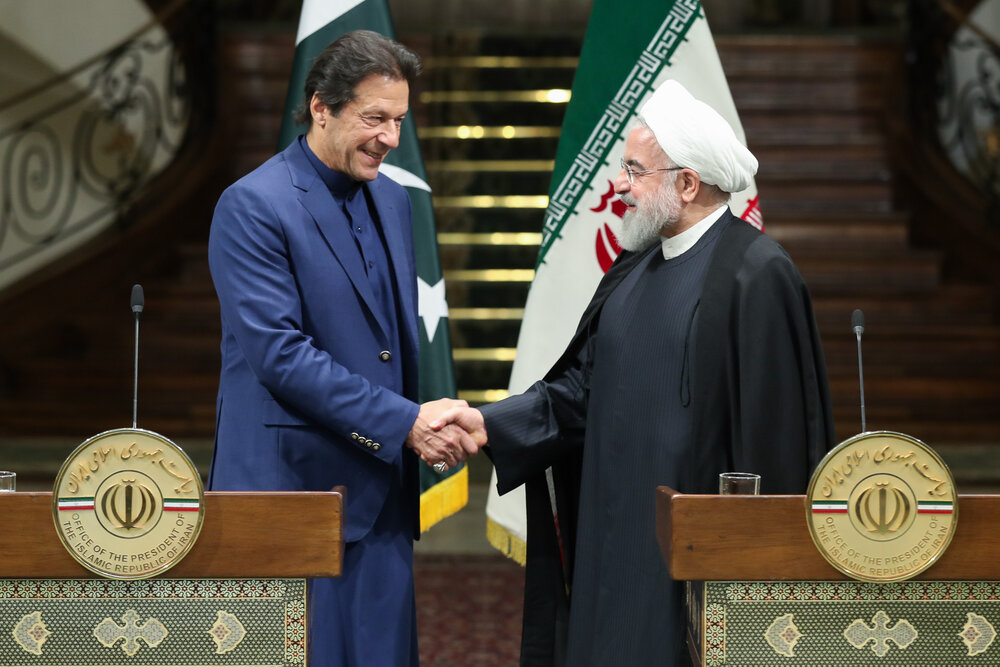Iran will give positive response to good intention, Rouhani says as Pakistan PM seeks to heal Tehran-Riyadh rifts

TEHRAN – President Hassan Rouhani said on Sunday that Iran will give positive response to “good intention” as Pakistani Prime Minister Imran Khan visited Tehran on Sunday in efforts to “facilitate” possible dialogue between Iran and Saudi Arabia whose relations have been cut and been caught in a kind of conflict over a series of issues, mainly the Saudi war on Yemen.
“Iran welcomes good intention and efforts by the Pakistani prime minister to settle tension in the region to restore peace and stability to the region,” Rouhani said during a joint press conference with Khan.
Rouhani added that Tehran and Islamabad share the view that regional issues should be settled through dialogue.
For his part, Khan said that any new conflict will be harmful to the regional people.
“The people in the region, especially in Afghanistan and Syria, are still suffering from the consequences of terrorism. So, there must not be a new conflict,” the prime minister insisted.
He noted that there must not be a clash between Iran and Saudi Arabia, because its consequences will influence the entire region.
“We believe that we can solve differences through dialogue,” the prime minister pointed out.
Khan said it is an initiative by Pakistan itself to resolve conflicts between Iran and Pakistan.
“Pakistan is not a mediator between Iran and Pakistan. It only wants to play the role of facilitator between the two countries.”
Pointing to his visit to Saudi Arabia on Tuesday, Khan said that he will introduce Pakistan’s initiatives on peace and stability and an end to differences and tensions.
He also said the main motive behind his visit to Iran is that “Pakistan, under no circumstances, does not like to see another war in the region.”
Khan’s visit to Tehran took place two days after missile attacks on an Iranian oil tanker in the Red Sea, 60 miles away from the Saudi port city of Jeddah. Suspicious attacks on commercial ships in the Sea of Oman in June and July also unnerved countries in the region and beyond.
Rouhani said, “It will be a big mistake if a country imagines that it can cause insecurity in the region without receiving a response.”
The Iranian president added, “The Middle East region, especially the Persian Gulf and the Sea of Oman, is a very sensitive region in the world. So, we discussed maintaining stability and long-lasting peace in the region in our talks.”
Elsewhere, Rouhani said, “Pakistan’s prime minister noted that the key to settle issues is ending the war in Yemen and immediately helping the Yemenis, and this can be a very good start.”
Khan also told reporters that during this participation at the UN General Assembly in New York in September he was asked by U.S. President Donald Trump to mediate between Tehran and Washington.
Before talks of mediation between Iran and the U.S. in the press conference by Khan, Rouhani said Iran has informed Pakistan about Tehran’s position on the 2015 nuclear deal and elaborated on the ways that the United States can return to the deal and lift sanctions.
Rouhani reiterated Tehran’s stated position that the U.S. sanctions on Iran are instance of “economic terrorism”.
Iran has clearly reminded officials in the White House that any dialogue between Iran and the United States in entirely dependent on the lifting of sanctions on Iran and Washington’s return to the JCPOA, the official name for the nuclear agreement.
Rouhani calls Iran-Pakistan ties “strategic”
On relations between Iran and Pakistan, Rouhani said the relationship between the two neighboring is “strategic”.
Khan also said, “The Islamic Republic of Iran has always been a friendly neighbor to Pakistan and has always supported Pakistan in difficult time.”
He also praised Iran’s supports for the people of Kashmir.
NA/PA
Leave a Comment